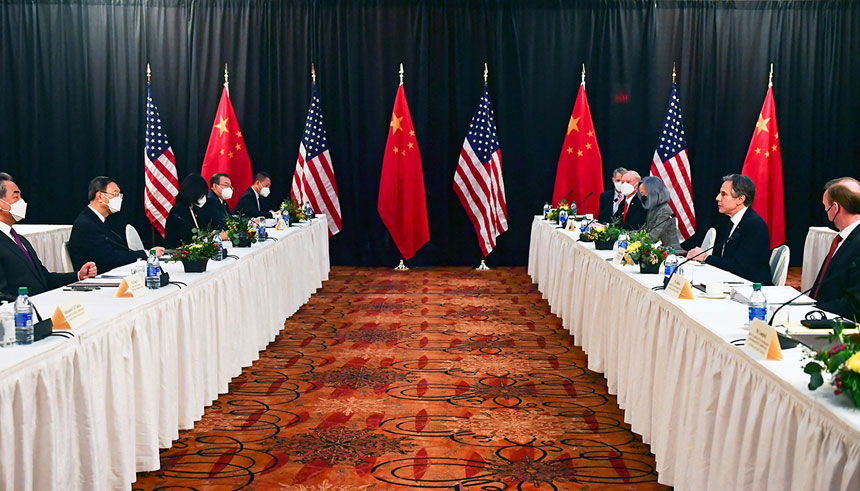US-Asia Business
US-China Market Watch: Alaska Trade Meeting, Digital Yuan, Alibaba to Sell Off Media Assets
By Angela Bao

Your monthly roundup of the latest US-China business and industry news.
U.S. and China have first high-level meeting, China tariffs likely to remain in place
The U.S. and China had their first high-level trade talks in Alaska, where discussions over China’s trade practices reportedly became tense. U.S. Secretary of State Antony Blinken opened the talks with a list of grievances against China, which include China’s clampdown on Hong Kong and cyberattacks. High-ranking Communist Party member Yang Jiechi responded by saying that the U.S. should stop pushing its democratic ideals on the rest of the world. Although the Beijing side ultimately described the talks as “substantive,” the American team has largely dismissed those claims and said it was unlikely there will be significant change on China’s part.
United States Trade Representative Katherine Tai has stated the U.S. isn’t ready to lift Trump’s tariffs on China. Tai was quoted saying that suddenly lifting the tariffs could negatively impact the economy, although she added that the U.S. was open to negotiations with China. President Joe Biden has also said that he will continue to insist that China abide by international fair trade rules.
PBOC builds up its digital currency, support for solar and wind power
The People’s Bank of China (PBOC) said that its planned digital currency will develop alongside Chinese fintech platforms like Alipay and WeChat Pay, which together comprise 98% of China’s mobile payments market. One of the primary reasons the central bank was launching a digital currency, called DC/EP, was to provide backup for and prevent any negative impact on the financial system, should something happen to those platforms, says Mu Changchun, PBOC’s director of digital currency research institute. The PBOC has already tested their digital yuan in several cities across the country.
The PBOC said it would also increase support for the solar and wind power industries that were experiencing a cash crunch, so that the country could meet carbon emissions cuts and renewable industry growth targets that President Xi Jinping had set.
Alibaba told by Beijing to sell off media assets
As part of the Chinese government’s crackdown on domestic tech giants, Beijing has ordered Alibaba Group to sell off its media assets. The government is largely concerned with Alibaba’s news and social media holdings (the company owns in entirety the South China Morning Post, which is the largest English-language newspaper in the region, as well as 30% of Weibo, which is China’s version of Twitter), and the undue influence Alibaba could have on the public.
On the entertainment side, those assets would also include Alibaba’s wholly-owned Alibaba Pictures Group, as well as stakes in Steven Spielberg’s Amblin Entertainment, China’s Bona Film Group and Huayi Brothers, among others.
Alibaba’s regulatory troubles started in November 2020, when Ant Group had to scrap its planned IPO on the Shanghai and Hong Kong stock exchanges, due to sudden “changes in the financial technology regulatory environment.”
Warner Music forms joint venture with Tencent
As part of an expanded agreement between Warner Music Group and Tencent Music Entertainment Group, the two companies will be forming a joint venture record label focused on the China market, along with expanding the agreement they initially signed in 2020.
Under the joint venture record label, Warner will leverage its “global resources” and expertise in supporting artists’ careers, and Tencent will utilize its influence in mainland China. As part of the expansion, Tencent Music will continue keeping Warner Music Group’s catalogue of music available on all of Tencent’s platforms, which include QQ Music and its online karaoke platform WeSing, as well as some designated connected devices like car audio systems.
Silicon Valley self-driving truck startup partners with China’s Hesai
Kodiak Robotics, a Silicon Valley autonomous truck startup, has partnered with Shanghai-based Hesai Technology Co., a lidar (light detection and ranging) maker. As part of the partnership, Kodiak will integrate Hesai’s lidar technology into its trucking system. Lidar technology helps cars detect objects around the vehicle, and Kodiak said it will use Hesai’s lidar on each side of their trucks.
One of China’s largest automakers SAIC Motor is also partnering with U.S. lidar company Luminar Technologies for SAIC’s “R” brand of autonomous vehicles, which they plan to have in production in China in 2022.
Sign up for the Reach Further Newsletter
We’ll keep you in the know about the latest US-Asia business news and trends.
Suscríbase al boletín Reach Further
Lo mantendremos informado sobre las últimas noticias y tendencias comerciales entre Estados Unidos y China.

